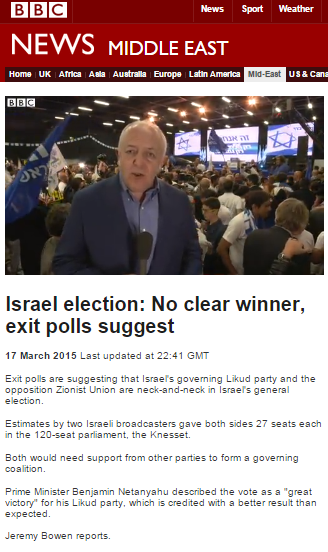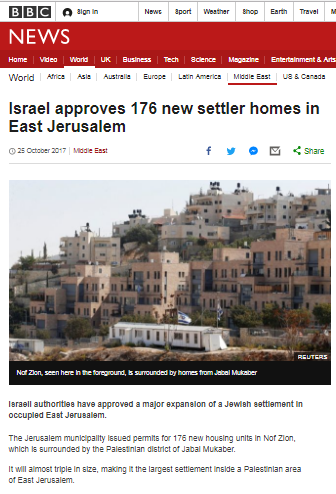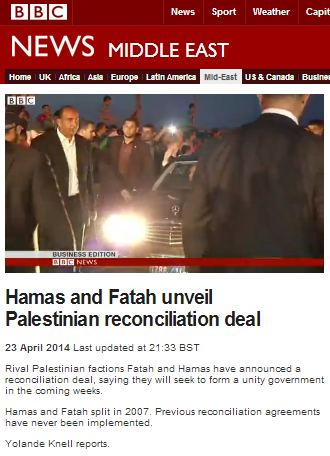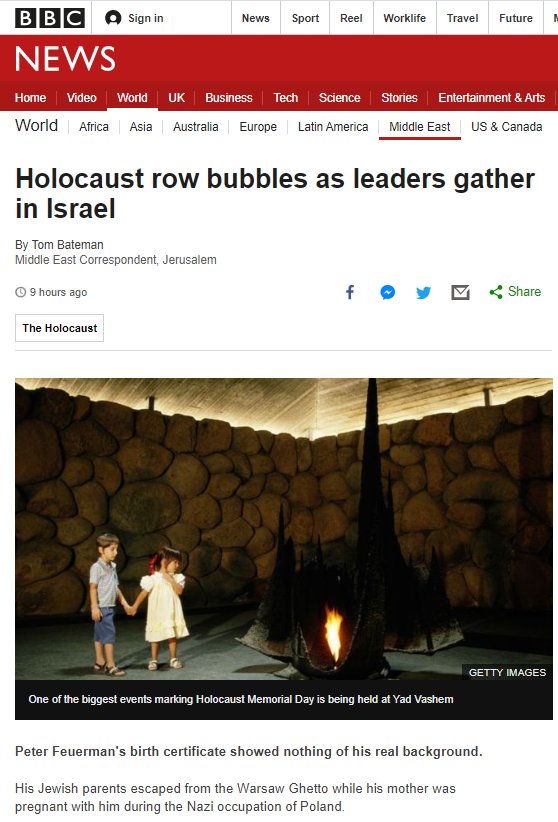In addition to Yolande Knell’s propaganda laden view of the Israeli election from Ramallah, March 17th saw the appearance of several filmed reports for television news programmes from various BBC correspondents.
Lyse Doucet produced a report titled “A closer look at Israeli politics and the election” in which viewers were told that:
“Likud is hawkish on security and critical of the nuclear negotiations with Iran.”
Audiences reading, viewing and listening to content on other BBC platforms on that day would have noticed that the adjective ‘hawkish’ – defined as “advocating an aggressive or warlike policy, especially in foreign affairs” and “supporting the use of force in political relationships rather than discussion or other more peaceful solutions” – was very popular with BBC correspondents, despite the fact that the outgoing Likud-led Israeli government engaged in nine months of negotiations with the PLO and went to considerable lengths to try to avoid all out conflict with Hamas and other terrorist organisations in the Gaza Strip last summer.
Another filmed report was produced by BBC Arabic’s Issam Ikirmawi under the title “Israel elections: Voting in Nazareth“.
BBC television audiences also saw a filmed report by Jeremy Bowen which purported to enlighten them on the topic of “What do Israeli voters want?” and opened with the sarcastic quip:
“Not the drums of war – for once. These were beating time at the Jerusalem marathon.”
Bowen’s suggestion that the previous government had put “expensive Jewish settlements in occupied Palestinian territory ahead of the cost of living” failed to clarify to BBC audiences that the status of Area C (in which all Israeli towns and villages are located) is in fact subject to negotiation according to the terms of the Oslo Accords and his categorization of that land as “occupied Palestinian territory” is hence misleading. Similarly, on a helicopter ride Bowen purported to show viewers “…the barrier that separates Israel from the Palestinian West Bank…” without any mention of the issue of final status negotiations and with no clarification of the reason why that anti-terrorist fence had to be built. According to Bowen, the anti-terrorist fence”…shows Israel’s security preoccupation with the Palestinians…” but again, no effort was made to explain to viewers what that actually means, or why.
Whilst he acknowledged that economy related issues were of prime importance to Israeli voters in this election, Bowen failed to provide audiences with any meaningful factual background on that topic, instead – like so many of his colleagues – constantly bringing the focus of his reporting back to the issue upon which Israelis did not go to the polls to decide.
“…but in the election the political future of that relationship [with the Palestinians] has not been a big issue. House prices are much more important and that’s because Israelis – like Palestinians – have got very cynical about the chances of a peace agreement. Up to now the negotiations have failed.”
A more accurate word than ‘cynical’ to describe the approach of a nation which still overwhelmingly supports a two-state solution in theory but cannot see a partner for that aspiration on the horizon, would have been ‘realistic’.
Despite being aware that “polls aren’t reliable” – as he noted at the end of his report – Bowen nevertheless earlier promoted the notion that “Yitzhak Herzog of the new centre Left alliance Zionist Union has turned the polls around…”.
Soon after voting came to an end at 10 pm and the first exit poll results became available, Jeremy Bowen produced a report titled “Israel election: No clear winner, exit polls suggest“. Once again, his reliance on informal polls – coupled perhaps with over-confidence in his own understanding of the Israeli political system and Israelis – caused him to provide BBC audiences with inaccurate information.
“In a country where it’s possible to live very well, economic pressures became the most potent issue in the campaign. Never mind the pursuit of the high life: falling living standards for many Israelis took votes away from the prime minister.”
“Isaac Herzog, the leader of the Zionist Union alliance, did not let up on social and financial issues and led the polls through the last weeks of campaigning.”
“The Israeli people have not voted for any kind of radical change but they haven’t given Mr Netanyahu a resounding vote of confidence either.” [all emphasis added]
Part of Bowen’s report focused on the Joint Arab List and residents of Jerusalem, Acco, Jaffa, Ramla, Lod, Ma’alot-Tarshiha and elsewhere might have been surprised to hear that:
“One significant development came from Haifa in the north: about the closest Israel gets to a mixed city where its Jewish and Arab citizens can live in relative harmony.” [emphasis added]
He continued:
Ayman Odeh […] heads the Joint List – an alliance of parties mainly representing the 20% or so of the Israeli citizens who are from Palestinian families who didn’t flee or get expelled when Israel was created in 1948. He told me this day would be historic as his party would push the Right Wing off into opposition. That might not happen. But the Joint List has shown that Israel’s Arab citizens are ready to flex some new political muscles, potentially providing crucial support for the centre Left.”
In fact, by the time Bowen made that declaration the Joint Arab List had already indicated ten days previously that it had no intention of supporting any shade of the Israeli Left when it refused to collaborate even with Meretz on a surplus vote sharing agreement.
“Last week, Herzog and Meretz leader Zehava Gal-On tried to broker a deal by which the Zionist Union would sign a vote-sharing agreement with Yesh Atid, and Meretz with the Joint List.
Herzog called all the heads of the Arab parties that make up the Joint List, but Balad leader Jamal Zehalka refused to pick up the phone.
Joint List head Ayman Odeh was in favor of signing the deal with Meretz, but Balad ruled it out because it did not want to cooperate with a Zionist party in any way. Zehalka even threatened to remove Balad from the Joint List, a threat that at this stage is not permitted by law.”
The Joint Arab List secured 13 places in the Knesset in this election (just two seats more than the combined number secured by its component parties running separately in the previous one) indicating that Bowen’s prophesy of “new political muscles” was – like much of the rest of his analysis – based more on his own ideas of how Israel should be than on objectively viewed reality.




